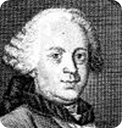
Hans de Hofman was born 10 July 1713, the first son of Sören Hofman (1688-1771). When he was four years old, he was sent to his grandmother in Copenhagen where he began his studies. At the university, he chose Hans Gram as his private teacher. He took his exam in law 1734 and served as Judge in Borgretten 1740-1743.
He became President in Fredericia in 1760 and Chief Administrative Officer over the Koldinghus county in 1773. In 1743 he had bought the estate Skerrildgaard by Horsens from his father and on this farm he cultivated his interests in farming and related subjects. He published several papers and books on a number of different topics such as meat-trading and manufacturing. He travelled all over Denmark and claimed to have visited all cities in the land. His contributions to the society were awarded with the Konferensraad title and the White Ribbon on 1st May 1782. A man of high interest in culture and literature, he published the 11-book strong "Samling af publique og private Stiftelser, Fundationer etc" in 1755, later to be known as "Hofmans Fundatser". He also concluded the work on "Den Danske Atlas", a work started by his brother-in-law Prokansler Erik Pontoppidan.
Hans de Hofman contributed heavily to the construction of Fredericia town hall at corner of Vendersgade and Sjællandsgade. He invested over 400 Rdl. in the project. The building - based on drawings by Thomas Thomsen was erected in 1762. The house was demolished in 1860.
In 1743, he married Bodil Bering (1726-1769), a daughter of merchant Peter Bering (1700-1739) and Elisabeth Cathrine Hofgaard (1707-1731). He married a second time, the 9th of February 1770 to Marie Elisabeth de Beenfeldt (1737-1816) on the estate Olstedgaard. She was born in 1737 on Lammehave estate by Ringe. His children were Peder Hofman in his first marriage but died young (1745-1748), and Bolette Christiane de Hofman (1770-1791) in his second marriage. Hans de Hofman died 3 February 1793 in Fredericia, 80 years old. He is buried in Nebsager church, close to Skerrildgaard. With him, the noble de Hofman family on the male side died out.
|